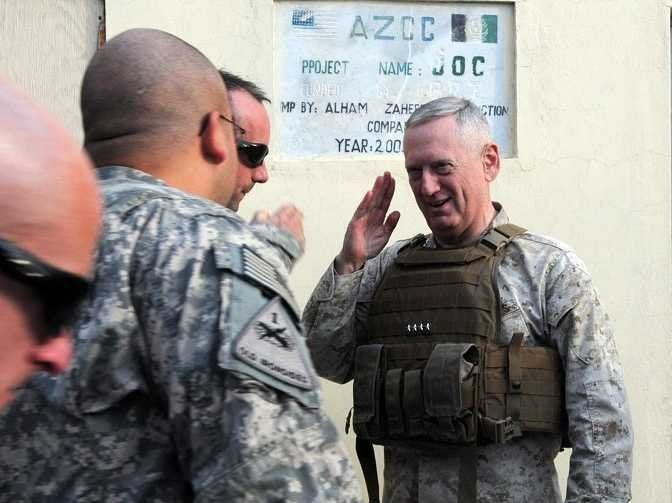Gold Dragon
Well-Known Member
Milley acknowledging in a graduation ceremony that his presence at at the photo op was a mistake.
National War College Graduation Ceremony
Milley speaks to the graduates at 10:00 and admits his mistake at 19:30. A very good speech defending that great document, the US Constitution.
There is the Milley memo insinuating that their orders could be at odds with their oath to the constitution.
There is Esper publicly opposing Trump on the appropriateness of the Insurrection Act and almost getting fired for it.
The retired generals/admirals including Mattis, Kelly, Mullen, Powell, Allen, McRaven and 89 former defense officials writing scathing public rebukes about how Trump violated the constitution.
There is the National Guard who were at the front lines publicly saying the white house is lying and covering it up.
Atlantic: Trump Corrupts Everyone Around Him
National War College Graduation Ceremony
Milley speaks to the graduates at 10:00 and admits his mistake at 19:30. A very good speech defending that great document, the US Constitution.
There is the Milley memo insinuating that their orders could be at odds with their oath to the constitution.
There is Esper publicly opposing Trump on the appropriateness of the Insurrection Act and almost getting fired for it.
The retired generals/admirals including Mattis, Kelly, Mullen, Powell, Allen, McRaven and 89 former defense officials writing scathing public rebukes about how Trump violated the constitution.
There is the National Guard who were at the front lines publicly saying the white house is lying and covering it up.
Atlantic: Trump Corrupts Everyone Around Him
Walking behind Trump during his brief, bizarre photo op was Milley—clad in combat fatigues—as well as Defense Secretary Mark Esper, Attorney General William Barr, and others. The incident has become a flash point in civilian-military affairs, drawing unusual condemnations from former Trump Defense Secretary James Mattis, former Chairman of the Joint Chiefs Mike Mullen, and a slew of other former military officials.
Today, in his first public remarks, Milley acknowledged that he’d made a mistake.
“I should not have been there,” Milley said in a videotaped commencement address to National Defense University, first reported by The New York Times. “My presence in that moment and in that environment created a perception of the military involved in domestic politics.”
...
The Monday-night clearance of Lafayette Square and the surrounding streets proved to be a disaster for the military anyway. Top civilian and uniformed leaders allowed themselves to be seen as props, and the D.C. National Guard—which reports directly to the Pentagon—helped assist in the forcible clearance of demonstrators exercising their First Amendment rights, all so Trump could make a stilted appearance with a Bible. Esper, the defense secretary, has sought to distance himself from the photo op, saying he didn’t know what was planned when the group left the White House. The Pentagon also previously said Milley believed they were going to review troops and didn’t know about the clearance.
...
To get Trump to back off his demand to use active-duty troops, Pentagon officials had to push for a show of force that would sate the president’s insistence that protesters be “dominated.” The Times reported:
Senior Army leaders—in an effort to prevent what they feared would be a calamitous outcome if President Trump ordered combat troops from the 82nd Airborne Division holding just outside city limits to the streets—leaned heavily on the Guard to carry out aggressive tactics to prove it could do the job without active-duty forces.
Perhaps for military leaders, the distinction between the Guard cracking down on peaceful protesters and active-duty troops was meaningful. For the ordinary citizen, though, the images were clear: Troops in fatigues were breaking up demonstrations in Lafayette Square, and Milley was striding behind the president. In short, to paraphrase a Vietnam-era coinage, the military had to crack down on protesters to prevent the military from cracking down on protesters.
...
That shows the dilemma facing officials like Milley. If they want to protect the Constitution or the institutions they serve—the Army, the State Department, the Foreign Service—they can try to do so by ceding some territory to Trump and doing things they otherwise wouldn’t countenance. They hesitate to defy the president, because it could mean being fired, and they tell themselves that if they leave, whoever replaces them will be more of a pliable toady. But maintaining that balance is impossible over time, and eventually they have to either go through with something terrible or else risk losing their job—and often both.
Take former Ambassadors Kurt Volker and Gordon Sondland, who testified during impeachment hearings last year that they gritted their teeth and pressured Ukrainian President Volodymyr Zelensky to announce an investigation into Joe Biden’s family. They concluded that Trump’s claims were baseless, but they also worried that unless Zelensky made the announcement, vital American aid to Ukraine in its struggle against Russia was in danger. You know how the story ended: Ukraine got the aid, though the incident weakened its government; Volker and Sondland were forced out; and Trump survived the impeachment emboldened.
It’s easy to dismiss the rationalization that Trump’s reluctant or ambivalent enablers use as simple self-justification, but it’s probably true: If they leave, whoever follows will almost certainly be a loyalist or sycophant who is even worse at standing up to Trump.
...
The fact that the rationalization is true is what makes it most dangerous. Trump is effective at corrupting apparently well-meaning officials like Milley, because they don’t have any good choices. The only winning move, as a classic Cold War study of military psychology concluded, is not to play.
Last edited:

